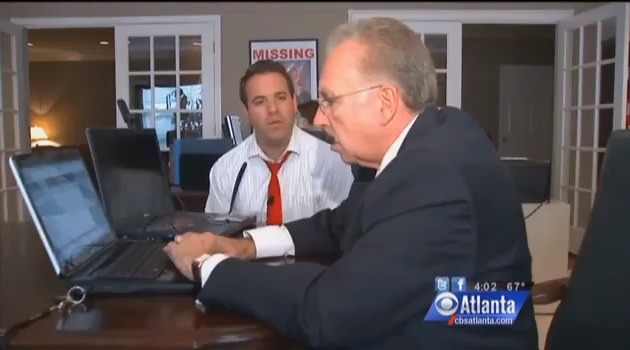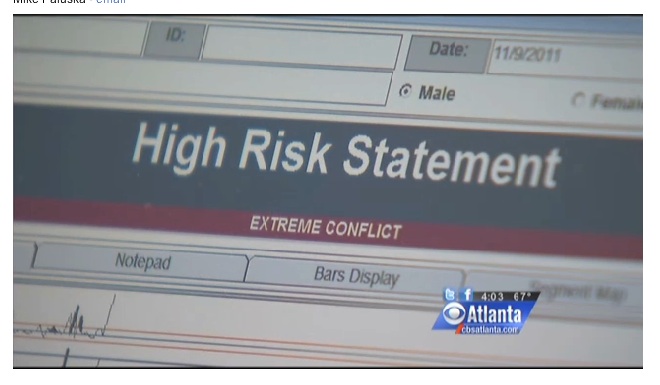
On Wednesday, 9 November 2011, CBS Atlanta aired an interview with private investigator T.J. Ward, who used a computer program to analyze recorded statements by Republican presidential candidate Herman Cain and Sharon Bialek, who alleges that Cain made a sexual advance on her when she sought his help getting a job. According to Ward’s software, Cain “is being truthful, totally truthful” in denying Bialek’s claim, while Bialek “is fabricating what transpired.”
Ward claimed his software cost $15,000 and has an accuracy rate of 95%. While CBS Atlanta did not disclose the name of this software, a link on Ward’s website indicates that it is Layered Voice Analysis (LVA), a program developed by Amir Liberman’s Nemesysco, Ltd., an Israeli company. This software was completely discredited by Swedish linguists Anders Eriksson and Francisco Lacerda in a 2007 article titled “Charlatanry in Speech Science: A Problem to Be Taken Seriously” (International Journal of Speech, Language and the Law, Vol. 14, No. 2). For more on LVA, see “Nemesysco Founder Amir Liberman Is a Charlatan.”
Not that it matters (LVA being pseudoscientific flapdoodle), but it is perhaps worth observing that private investigator T.J. Ward had chosen the setting for analyzing a male voice when conducting his analysis of Sharon Bialek’s remarks:
CBS Atlanta should have done its homework before running with a “news” story based on emperor’s-new-clothes technology.

Why would they do their homework. Yellow journalism works best. They don’t care if they get the truth out. They care if they get notoriety.
Subject: Additional Informational Reading: LVA failed as a lie detector in two recent studies
Global Moderator
*****
Online
https://antipolygraph.org/yabbfiles/avatars/maschke.jpg
Make-believe science
yields make-believe
security.
Posts: 4143
The Hague, The Netherlands
https://antipolygraph.org/yabbfiles/Templates/Forum/default/exclamation.gifU.S. Special Operations Command Buys Into Layered Voice Analysis
Sep 26th, 2007, 5:36am
It seems that despite having been forced to terminate its use of the Computer Voice Stress Analyzer (CVSA), a device that by the manufacturer’s own admission “is not capable of lie detection,” U.S. Special Operations Command (SOCOM), headquartered at Fort Bragg, North Carolina, remains fascinated with the pseudoscience of voice stress analysis. An announcement on FBODaily.com indicates that SOCOM has awarded the Transpire Group of Dulles, Virginia a $145,475 contract for Layered Voice Analysis (LVA)–a bogus lie detection technology brought to us by Nemesysco–the Israeli company that a decade ago marketed the Handy Truster voice lie detector.
Nemesysco’s Layered Voice Analysis utterly failed as a lie detector in two recent studies:
Voice Stress Analysis Instrument Evaluation (365 kb PDF). Final Report, Counterintelligence Field Activity (CIFA) Contract FA 4814-04-0011. By Harry Hollien and James D. Harnsberger. University of Florida, Gainesville. 17 March 2006. “The findings generated by this study led to the conclusion the [sic] neither the CVSA nor the LVA were sensitive to the presence of deception or stress.”
Assessing the Validity of Voice Stress Analysis Tools in a Jail Setting (2.1 mb PDF). Research report by Kelly R. Damphousse, Laura Pointon, Deidre Upchurch, and Rebecca K. Moore. National Criminal Justice Reference Service (NCJRS) Document No. 219031 dated 31 March 2007. “The goal of this study was to test the validity and reliability of two popular VSA programs (LVA [Layered Voice Analysis] and CVSA [Computer Voice Stress Analyzer]) in a ‘real world’ setting. Questions about recent drug use were asked of a random sample of arrestees in a county jail. Their responses and the VSA output were compared to a subsequent urinalysis to determine if the VSA programs could detect deception. Both VSA programs show poor validity – neither program efficiently determined who was being deceptive about recent drug use. The programs were not able to detect deception at a rate any better than chance….”